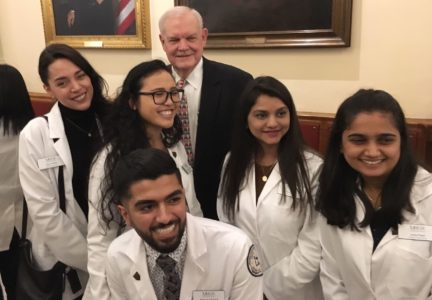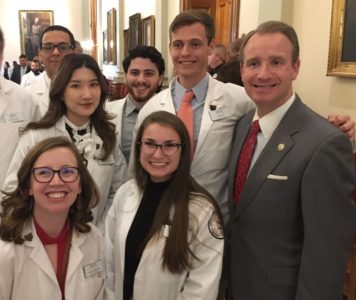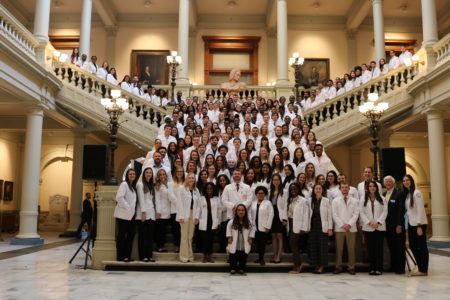Is toner dangerous? Plus pingpong and Parkinson’s, Georgia preps for CoviD-19, and more
28 Feb 2020
Posted by Andrew Kantor
Mercer and South at the Gold Dome
Check out these pics of student pharmacists from Mercer and South universities on their lobbying visit to the state capitol.
More than 200 students from the two schools got a behind-the-scenes look from GPhA’s advocacy team before setting out to meet with legislators about the critical bills coming up in this year’s session.
Member shout-out
Big kudos to GPhA member and pharmacy owner Ben Ross, whose story was featured in the latest UGA Today.
At Ben Ross’s pharmacies, management remains local, and he is dedicated to his adopted hometown. The roots he planted in Statesboro back in 2008 have grown pretty deep, and he understands the needs of the community.
“When you own an independent pharmacy, it’s so much more than a business,” he says. “Your customers are your family. You want to make sure they are taken care of.”
Georgia considers insulin price caps
Two similar bills have been introduced in the Georgia legislature that would cap the cost of insulin.
One is from Sen. Burt Jones (R-Jackson) would cap the price of a vial of insulin at $150 and require financial reports from drug makers. The other, introduced by Sen. Jen Jordan (D-Atlanta), would cap insulin prices at $100 per vial and wouldn’t have the reporting requirements.
Hep A spreads
Tired of news about the CoviD-19 outbreak? Here’s something else to think about: “Hepatitis A cases continue to spread in north Georgia.”
An eczema breakthrough
Good news for mice with eczema: Washington University researchers have found a way to use drugs to kick-start the immune system (specifically “natural killer” cells) to fight it.
Et tu, toner?
Worrying about talcum powder is bad enough — now it seems that printer toner might cause genetic changes and a risk to health.
[A] single day of toner-particle exposure was enough to disturb the activity of genes associated with metabolism, immune response and other essential biological processes in the rat models. Overall–taking into account all 21 days of exposure and testing–the researchers observed genomic changes linked to cardiovascular, neurological and metabolic disorders.

CoviD-19 news
First community case: The U.S. likely has its first case of community-spread coronavirus — i.e., in someone who didn’t travel overseas. CDC is working to confirm it.
Georgia health authorities say they’re prepared for when the virus comes here. The DPH explains what it’s doing … and what you can do.
There are issues. Georgia Health News reports, “State challenges in tackling COVID-19 include testing, funding“.
Containment worked for a while, but… now it’s time to think ahead.
Yes, it’s coming. Listen to health authorities, not politicians or Facebook: The CDC says it’s likely to spready throughout the country happen: “[I]t’s important to note that current global circumstances suggest it is likely that this virus will cause a pandemic.”
Silent but sickening: “Even asymptomatic people who are infected may be able to spread the virus.”
A vaccine for the virus will likely take a year or more to be available, although a small biotech company in Cambridge, Mass., Moderna Therapeutics, says it will begin testing its vaccine candidate in April.
A treatment for CoviD-19, remdesivir, is also being tested.
Pingpong positive for Parkinson’s patients
“People with Parkinson’s who participated in a pingpong exercise program once a week for six months showed improvement in their Parkinson’s symptoms, according to a preliminary study.”
Anyone remember “Pepsi Clear”?
Colgate has introduced “Colgate Zero” toothpaste, which it says has no artificial ingredients.

We look forward to the company merging that with its existing line to create “Colgate Absolute Zero.”








